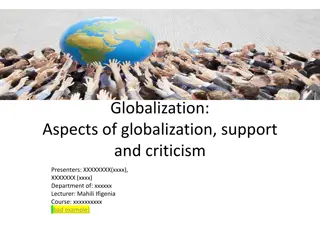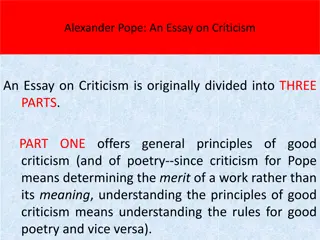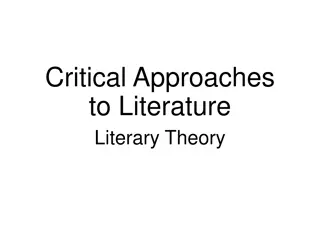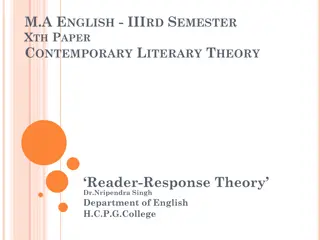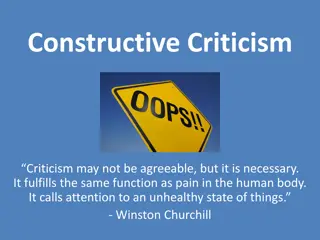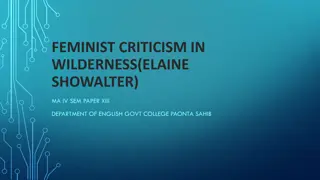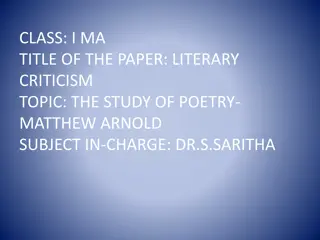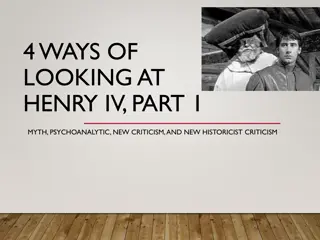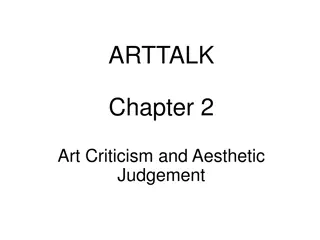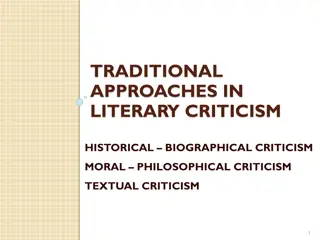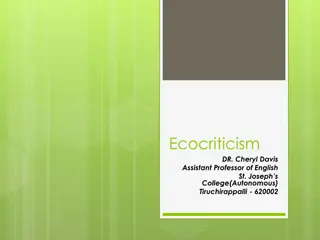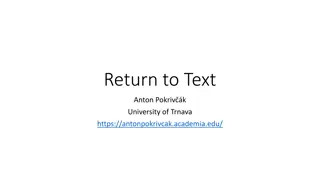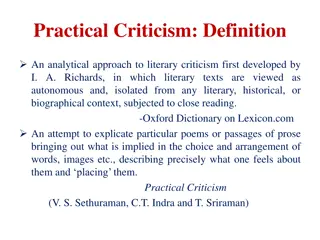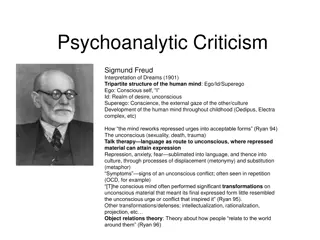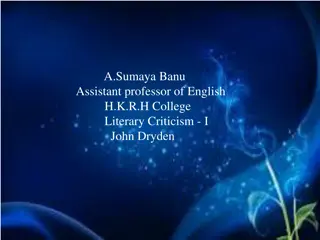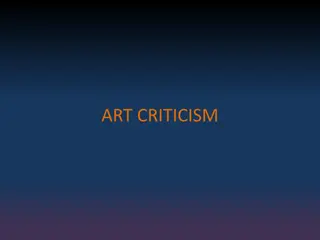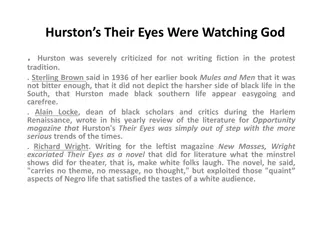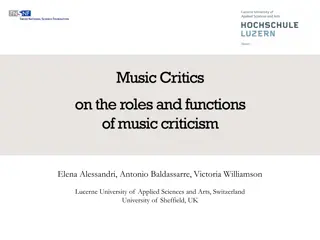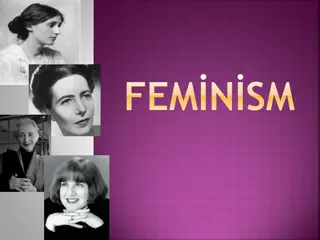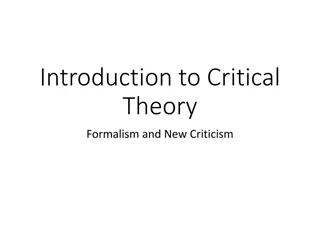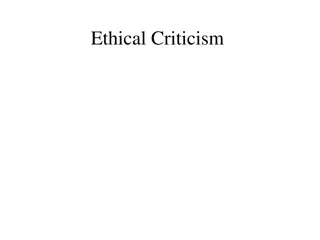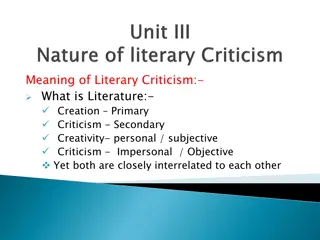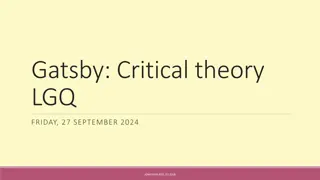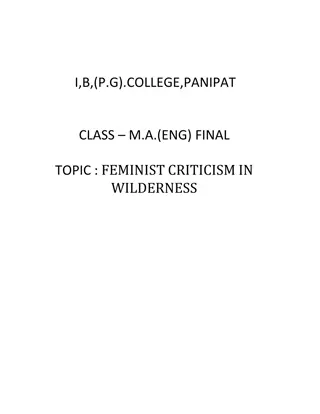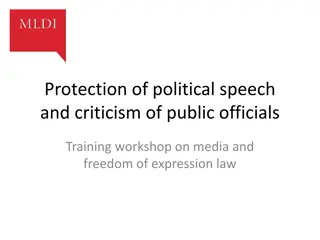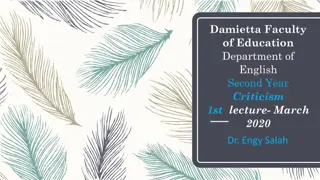Understanding Globalization: Aspects, Support, and Criticism
Globalization encompasses various aspects such as international integration, advances in transportation and telecommunications, interdependence of cultural and economic activities. The term has been widely used since the mid-1980s, leading to both support and criticism. While economic globalization
3 views • 25 slides
Overview of Alexander Pope's "An Essay on Criticism
Alexander Pope's "An Essay on Criticism" is divided into three parts discussing the principles of good criticism, offering solutions to critical problems, and identifying obstacles to good criticism. Part One delves into the challenges critics face due to partial judgments, false learning, and envy.
0 views • 17 slides
Effective Strategies for Literature Searches and Re-Use of Scholarly Literature
Conducting literature searches involves surveying existing publications and information on a specific topic. Different search strategies, from simple searches to systematic queries and snowballing, are utilized based on research needs. Learning objectives include building search strategies, using ad
3 views • 19 slides
Introduction to Isixhosa Language and Literature - Exploring Characters and Themes
This content provides an overview of Isixhosa as a first additional language (FAL) and delves into key aspects of literature such as character development and themes. It discusses the importance of characters in storytelling, emphasizing the significance of round and flat characters. The article als
3 views • 28 slides
Critical Approaches to Literature and Literary Theory
Explore different critical approaches to studying literature, including Reader-Response Criticism, Formalist Criticism, Psychological/Psychoanalytic Criticism, Sociological Criticism, and more. Dive into questions of how we read, interpret, and perceive meaning in texts, considering the impact of vi
1 views • 20 slides
Understanding Reader-Response Theory in Literary Criticism
Reader-response criticism in literary theory emphasizes the reader's role in interpreting and creating meaning from a literary work. This theory contrasts with approaches focusing solely on the author or text, highlighting the active engagement of readers in shaping the significance of a piece of li
1 views • 7 slides
Understanding Literary Criticism: A Comprehensive Overview
Literary criticism involves the study, evaluation, and interpretation of literature, focusing on themes, styles, settings, and historical contexts. This discipline explores the meanings, workings, and values of literary works through interpretation, analysis, and evaluation. Various types of literar
2 views • 20 slides
Understanding Constructive Criticism in College
Constructive criticism plays a vital role in personal growth and development. It distinguishes between constructive and destructive feedback, highlighting the intent behind criticism and its significance in college settings. Embracing feedback positively can enhance one's learning experience and aca
1 views • 13 slides
Feminist Criticism in the Wilderness by Elaine Showalter - Analysis
Elaine Showalter's essay "Feminist Criticism in the Wilderness" delves into the realm of feminist literary critique, addressing the diversity among women writers and emphasizing the importance of considering factors beyond gender. Showalter highlights the challenges and goals of feminist criticism w
0 views • 13 slides
Comprehensive Literature Review Guidelines for Your Dissertation
Discover expert guidelines for conducting a thorough literature review in your dissertation. Explore topics such as literature search strategies, theoretical frameworks, review of the literature, synthesis, and analysis, with actionable tips provided throughout.
0 views • 11 slides
Matthew Arnold's Literary Criticism: The Study of Poetry
Explore Matthew Arnold's approach to literary criticism focusing on the study of poetry. Arnold's work as a critic of literature, society, and religion is discussed, emphasizing his three estimates of poetry - the Real Estimate, the Historic Estimate, and the Personal Estimate. The Real Estimate hig
0 views • 9 slides
Exploring Different Perspectives on Henry IV, Part 1 Through Myth, Psychoanalytic, New Criticism, and New Historicist Criticism
Delve into various critical lenses such as myth, psychoanalytic, New Criticism, and New Historicist Criticism to analyze Henry IV, Part 1. Uncover the mythic origins of characters like Falstaff, connections to ancient rituals, and the symbolism of killing the king. Discover how literature intertwine
4 views • 26 slides
Exploring the Significance of Persian Language and Literature in Indian History
Persian language and literature hold a crucial place in Indian history, serving as a prime source for understanding the medieval period. Scholars in India have dedicated their lives to preserving and promoting Persian history, language, and literature. The rich cultural heritage of India, dating bac
0 views • 9 slides
Understanding Art Criticism and Aesthetic Judgement
Explore the world of art criticism and aesthetic judgement in Chapter 2 of ARTTALK. Discover the purpose of art criticism, learn to critique art, and understand aesthetic theories. Dive into the realm of professional critics, criteria for judgement, and the importance of forming your own opinions in
0 views • 38 slides
Traditional Approaches in Literary Criticism: An Overview
Literary studies in the early 20th century were influenced by traditional approaches like historical, biographical, moral, philosophical, and textual criticism. These approaches focus on external information to interpret literary works, connecting them to broader contexts in fields such as history,
0 views • 32 slides
Mastering the Literature Review Process
Understanding the significance of literature review, this guide emphasizes the essential steps involved in conducting a successful literature review - from planning and research problem identification to critical analysis and contribution to existing literature. It explains the importance of develop
0 views • 16 slides
Effective Strategies for Conducting Business Research Literature Review
This literature review provides insights into conducting business research effectively, covering topics such as how to search, read, and write literature reviews, along with the goals and types of literature. It emphasizes the importance of generating research ideas, demonstrating knowledge, and int
1 views • 13 slides
Understanding Ecocriticism: Literature, Nature, and Environment
Ecocriticism is the study of literature and its relationship with the environment, exploring how nature is portrayed in literary works. Originating in the 1990s, ecocriticism takes an earth-centered approach, emphasizing interconnectedness and ecological concepts. Scholars like William Rueckert and
2 views • 24 slides
Evolving Perspectives on Literature and Translation
Explore the intertwined relationship between national literature, comparative literature, and world literature, delving into the evolution of translation studies. Reflect on the shift from national literary histories to world histories of literature, highlighting the significance of world literature
3 views • 54 slides
Exploring Critical Theory Through Literary Criticism and Analogy
Delve into the realm of critical theory through literary criticism, using the analogy of different perspectives on seeing an orange to understand the various facets of analysis like reader response, Marxist/social power, feminist/gender, and psychoanalytic criticism. Discover how critical theory hel
0 views • 9 slides
Practical Criticism: Analysis and Appreciation of Poetry and Prose
Delve into the world of practical criticism and critical appreciation in BA III English studies with a focus on analyzing and appreciating poetry and prose. Explore the history, significance, and methodology behind this literary practice while gaining insights into interpreting unseen poems. Discove
3 views • 20 slides
The Evolution of Literary Criticism in the Digital Age
Exploring the shifting landscape of literary studies in the 21st century, this analysis delves into the challenges traditional literature faces in a world dominated by media and technology. Emphasizing the importance of refocusing on the text itself and the concept of literariness, the discussion hi
1 views • 19 slides
Understanding Social Anxiety and Avoidant Behaviors
Social anxiety involves intense fear and avoidance of social situations, leading to catastrophic thinking and physiological reactions like performance anxiety. Individuals may anticipate criticism, rejection, or embarrassment, which can interfere with their functioning. This condition can manifest a
3 views • 30 slides
Understanding Practical Criticism in Literary Analysis
Analysis of Practical Criticism, an approach developed by I.A. Richards, involves close examination of literary texts without historical or biographical context. It aims to encourage students to respond to poetry and literature by focusing on form and meaning, identifying sources of pleasure. The pr
0 views • 16 slides
Overview of Psychoanalytic Criticism and Object Relations Theory
Psychoanalytic Criticism, originating with Sigmund Freud and further developed by Melanie Klein and Jacques Lacan, explores the intricate workings of the human mind, delving into the tripartite structure of the ego, id, and superego. The theory encompasses concepts such as the interpretation of drea
0 views • 10 slides
John Dryden's Literary Criticism and Works
A look into the literary criticism and works of John Dryden, focusing on his formal treatises, advocacy of the heroic couplet, defense of rhymed couplets in tragedy, and discussions on poetry and painting. Dryden's writings encompass a variety of genres and styles, from dramatic criticism to epic po
0 views • 23 slides
Matthew Arnold's Impact on Literary Criticism and Poetry Evaluation
Matthew Arnold, a prominent Victorian poet and critic, revolutionized literary criticism by emphasizing the importance of knowing and promoting the best ideas in the world through critical evaluation. He introduced scientific objectivity to criticism and influenced a generation of critics. Arnold sa
0 views • 25 slides
Understanding Art Criticism: A Comprehensive Guide
Delve into the realm of art criticism to grasp the essence of responding to, interpreting, and making critical judgments about artworks. Explore the steps of art criticism, from description to judgment, and learn how to analyze artworks in terms of elements and principles of art and design.
0 views • 17 slides
The Complexity of Narrative Voices in "Their Eyes Were Watching God
Zora Neale Hurston's novel "Their Eyes Were Watching God" faced criticism for not conforming to traditional protest literature styles. The narrative features a compelling protagonist, Janie Crawford, who defies stereotypes of black women in literature. Hurston skillfully employs a dual narrative sty
0 views • 8 slides
Russian Formalism and American New Criticism Overview
Russian Formalism, a literary movement that emerged in the early 20th century, was a radical departure from traditional approaches to literary analysis. It sought to define literary criticism as a scientific profession, focusing on the autonomy of literature and employing linguistics for support. Th
0 views • 22 slides
Roles and Functions of Music Criticism: Insights from Researchers
Exploring the various aspects of music criticism, this study delves into the role of critics in evaluating music performance, their criteria for assessment, and the impact of their reviews. Researchers interviewed English and German-speaking critics to gain insights into their perspectives and pract
0 views • 20 slides
Evolution of Feminist Literary Criticism: Challenging Patriarchal Ideals Through History
Feminist literary criticism challenges historical patriarchal views in literature from ancient Greek beliefs to modern writings. The roots of prejudice against women have been deeply embedded in Western culture, with notable works like Mary Wollstonecraft's "A Vindication of the Rights of Women" pio
0 views • 42 slides
Understanding Literary Criticism: Formalism and New Criticism
Literary critics analyze and interpret works of literature, delving into social and historical contexts. They focus on techniques, themes, and cross-disciplinary exploration. Formalism, a critical lens, emphasizes internal elements of a text over external influences, seeking universal meanings expre
0 views • 11 slides
Exploring Ethical Criticism and Literature's Human Possibilities
Ethical criticism in literary studies revolves around the intersection of ethics, literature, and criticism. It tackles concerns about the relationship between value judgments, ethics, and aesthetics, emphasizing the importance of reconnecting criticism with moral principles. Literature offers a dee
0 views • 21 slides
Understanding Literary Criticism: Exploring the Art of Interpreting and Evaluating Literature
Literary criticism, rooted in ancient Greek and Roman traditions, involves interpreting, analyzing, and evaluating literary works. It has evolved over time, encompassing various theories and approaches to engage with literature critically. From mimetic theory to analytical criticism, different persp
0 views • 11 slides
The Status of Literature in Secondary Schools of the O.E.C.S. - Research Findings by Dr. Anthony Felicien
Research by Dr. Anthony Felicien examines the status of literature in secondary schools of the O.E.C.S., focusing on the decline of interest in literature among students, influenced by historical curriculum changes and parental attitudes. The study highlights the importance of studying literature fo
0 views • 35 slides
Understanding Lesbian and Gay Critique in Literature
Explore the evolving field of lesbian and gay criticism in literature, highlighting the challenges faced by LGBTQ individuals, the coded messages in texts, common themes, signs and cues, and key questions for analysis in queer theory. Delve into the political, poetic, and LGQ aspects of literary wor
0 views • 15 slides
Feminist Criticism in Wilderness: Analyzing Elaine Showalter's Essay
The essay by Elaine Showalter delves into feminist literary criticism, exploring its aims, challenges, and the perception of being in "wilderness." Showalter discusses the evolution of feminist criticism, the need for a solid theoretical framework, and the hurdles faced by feminist critics. She emph
0 views • 14 slides
Protection of Political Speech and Criticism: Ensuring Freedom of Expression for Public Officials
Understanding the importance of freedom of speech in political discourse, this workshop focuses on the legal framework protecting political speech and criticism of public officials. Highlighting the rights and responsibilities in democratic societies, the content emphasizes the necessity of open deb
0 views • 14 slides
Allegorical Representation and Realism in Literary Criticism: Dante and Ibn Rushd
Explore the allegorical representation in Dante Alighieri's works and the realism of Ibn Rushd [Averroes] with a focus on their unique perspectives on literature, philosophy, and the blending of poetic imitation with moral choice. Dive into the influence of these iconic figures on Western intellectu
0 views • 11 slides
